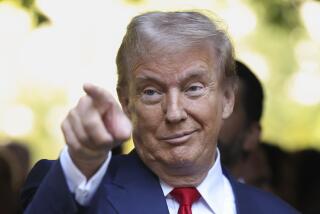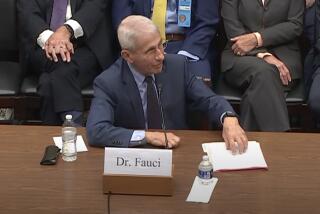Exiled Dissident Fang Denounces Bush’s China Policy : Trade: He calls the Administration’s position unprincipled and compares it with U.S. treatment of Moscow.
WASHINGTON — One year after the Bush Administration negotiated the release of Fang Lizhi, China’s leading dissident, he appeared before a congressional panel Wednesday to denounce President Bush’s policy toward the Chinese government as unprincipled.
Fang, now in exile at Princeton University, appeared at the opening of congressional hearings on China’s trade status to rebut Bush’s recent justifications for unconditionally extending China’s most-favored-nation trade benefits for another year.
Responding to the President’s frequently repeated argument that the situation in China is better than it was when he was U.S. envoy to Beijing in 1975, Fang noted that the same logic is never applied to the Soviet Union--and yet, Fang observed, the United States has long denied most-favored-nation trade privileges to Moscow.
“Why does no one say, ‘The Soviet Union today is much better off than the Soviet Union of the 1930s, under Stalin’s reign of terror’?” Fang asked.
Similarly, speaking of the President’s contention that extending most-favored trade benefits helps reformers inside China, he asked: “Why have Soviet reformers not received this same kind of ‘consideration’?”
Fang, an astrophysicist, was expelled from the Chinese Communist Party in 1987 after encouraging demonstrations for democracy and freedom of speech at a Chinese university where he was vice president.
Shortly after China’s bloody crackdown on pro-democracy demonstrators in 1989, Fang and his wife took refuge in the U.S. Embassy in Beijing. The Chinese regime denounced him as a traitor and criminal, stationed troops outside the embassy compound and threatened him with arrest.
The Bush Administration then pressed for his safe conduct out of China during a year of on-again, off-again negotiations with the Chinese government, including two controversial secret missions to Beijing by National Security Adviser Brent Scowcroft. Last June, China finally agreed to let Fang fly to freedom on a U.S. Air Force plane sent specially for him.
On Wednesday, one of the Bush Administration’s supporters, Rep. Jim Leach (R-Iowa), listened to Fang’s critique of the President’s China policy and then quipped: “There’s no person residing in the United States who’s more indebted in a way to Mr. Bush’s diplomacy than you, Mr. Fang.”
But moments later, Leach endorsed Fang’s willingness to denounce the policies of the Administration, which gave him protection and negotiated for his freedom.
“It’s the American way, and you should be free to do that,” he said.
Fang’s testimony included a strong denunciation of the argument by the Chinese government that it should not be judged by the same human rights standards applied in the West. That argument, he said, “is based on racial prejudice. . . . The United Nations’ Declaration of Human Rights forthrightly emphasizes that human rights do not vary with race or skin color.”
He also took a swipe at Japan’s policies toward China.
“The prestige of (Japan’s) leaders within Chinese public opinion really is not very high,” Fang asserted. “That is because they remain unmoved by basic conditions of human rights and want to ‘aid’ China economically. This kind of good intentions is either naive or hypocritical.”
The Chinese dissident did not call for Congress to revoke China’s trade benefits entirely. Rather, he suggested that Congress might extend the benefits with some sort of new human-rights conditions, making it clear that the Beijing government will lose its most-favored-nation trade status in the future if it does not act to ease the political repression in China.
At the opening of Wednesday’s hearings before members of the House Foreign Affairs Committee, several congressmen indicated that they strongly favor such a conditional extension of China’s most-favored trade status, rather than the no-strings-attached renewal recommended by Bush.
“China is not entitled to normal trade treatment, because human rights in China are abnormal and subnormal. . . ,” said California Rep. Tom Lantos (D-San Mateo). “My own preference would be to terminate most-favored-nation treatment. I realize under the circumstances, that is unrealistic. But I believe that the conditions that we set must be meaningful and biting.”
Leach, the ranking minority member of the House Foreign Affairs Asian and Pacific Affairs subcommittee, sought to defend Bush by arguing that those who want to limit China’s trade benefits are motivated by a desire to protect American industries from the impact of free trade.
“Last winter it was Iraq, last week it was Mexico, today it’s China,” Leach said. “The Democrats’ only answer to a foreign policy problem is protectionism.”
California Rep. Nancy Pelosi (D-San Francisco) retorted that last year, a bill she sponsored to attach human-rights conditions to China’s trade benefits passed in the House by a vote of 383 to 30, with strong Republican support. The bill died in the Senate in the last days of that Congress.
More to Read
Sign up for Essential California
The most important California stories and recommendations in your inbox every morning.
You may occasionally receive promotional content from the Los Angeles Times.










